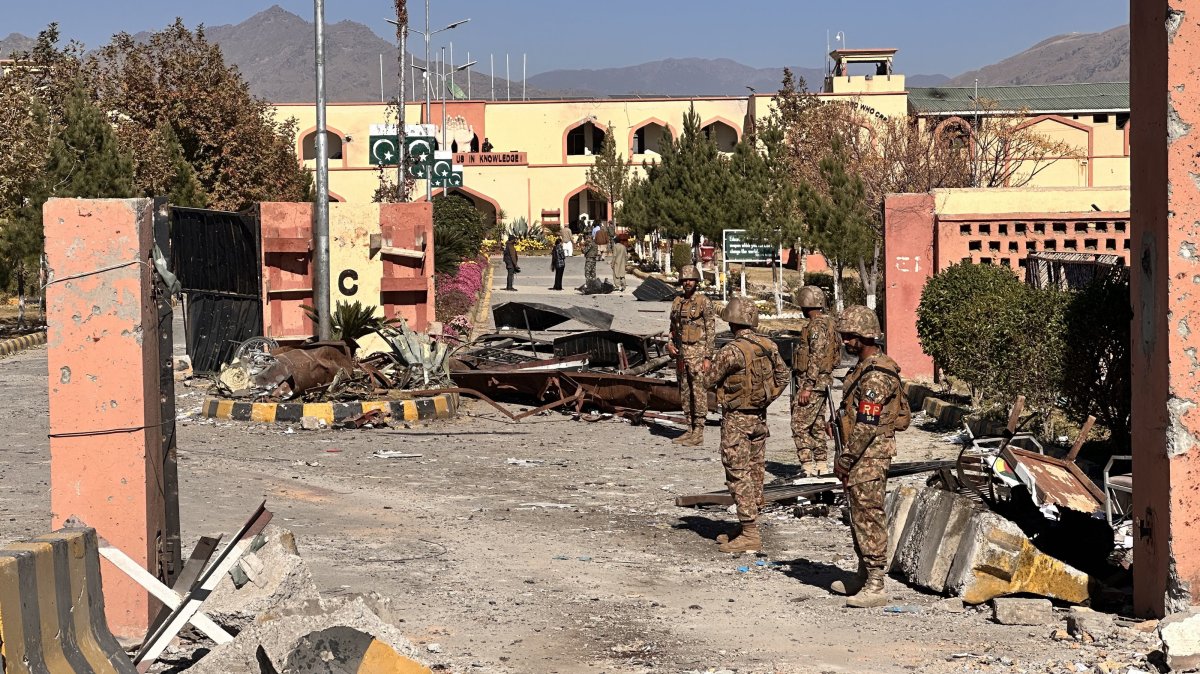Pakistan’s interior minister said Thursday that Afghan nationals were responsible for two deadly suicide attacks this week – one outside a district court in Islamabad and another targeting a military-run cadet college near the Afghan border – raising fresh tensions between the neighboring countries.
“In both suicide bombings, Afghan citizens were involved, and they carried out the attacks,” Interior Minister Mohsin Naqvi told reporters. Kabul did not immediately comment on the allegation.
Tuesday’s blast outside an Islamabad district court killed 12 people and wounded 27 others, shattering a sense of relative calm in a capital long viewed as safer than Pakistan’s conflict-ridden northwest.
A day earlier, three soldiers were killed when a suicide bomber and four other militants attempted to storm Cadet College Wana in Khyber Pakhtunkhwa province, sparking a fierce gunbattle.
The back-to-back attacks highlight Pakistan’s worsening security landscape, marked by resurgent militancy, strained relations with Afghanistan’s Taliban government and an increasingly fragile cease-fire along the border.
Prime Minister Shehbaz Sharif on Wednesday offered talks to Afghanistan’s Taliban government in a renewed peace overture.
His call, delivered in a televised speech, followed the collapse of peace negotiations in Istanbul last week and raised fears that a cease-fire brokered by Qatar and Türkiye could unravel and trigger new border clashes.
Pakistan wants Afghanistan to rein in the Pakistani Taliban – known as Tehrik-e-Taliban Pakistan, or TTP – which has claimed most attacks in Pakistan in recent years. The group has distanced itself from the latest bombings, saying it was not involved.
Pakistan has long accused the Afghan Taliban of harboring TTP leaders and fighters, an allegation Kabul denies.
One TTP breakaway faction, Jamaat-ul-Ahrar, initially claimed responsibility for the Islamabad bombing before one of its commanders retracted the statement.
The Pakistan army on Thursday escorted journalists from Islamabad to the cadet college, which showed clear signs of the assault.
Pakistan’s information minister, Attaullah Tarar, said Wednesday that all five attackers in the assault on Cadet College Wana were killed by security forces.
More than 600 people – including 525 cadets, teachers and staff – were safely rescued, he told reporters.
Tarar said the assailants appeared to be attempting a repeat of the 2014 Peshawar school massacre, when a TTP splinter group killed 154 people, mostly children, at an army-run school.
According to local media, authorities have arrested several suspects for questioning in connection with the Islamabad attack, and the detainees were captured in multiple raids.
Pakistan’s Ministry of Information said the attack on the cadet college was planned and directed from Afghanistan and carried out by Afghan nationals using weapons supplied from there.
In a post on X, the ministry said the assault was orchestrated by a militant identified only as Zahid, with approval from TTP chief Noor Wali Mehsud.
The attackers used “American-made” weapons brought from Afghanistan, the ministry said.
Pakistan has repeatedly said that U.S. military equipment left behind during the American withdrawal from Afghanistan in 2021 has fallen into militant hands and ultimately strengthened the Pakistani Taliban’s firepower.
Tensions between Pakistan and Afghanistan have spiked since last month, when Afghanistan accused Islamabad of launching drone strikes on Oct. 9 that killed several people in Kabul.
The strikes triggered cross-border clashes that left dozens of soldiers, civilians and militants dead before Qatar brokered a cease-fire on Oct. 19.
Two subsequent rounds of peace talks in Istanbul ended without progress after Kabul refused to provide written assurances that militants would not use Afghan soil to stage attacks inside Pakistan.
The TTP, which is separate from but allied with the Afghan Taliban, has been emboldened since the Taliban seized power in Afghanistan in 2021.
By Associated Press

